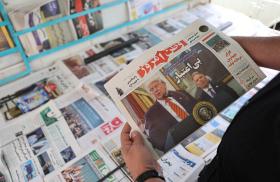Restoring the oil-for-fuel program would avert a near-term crisis and potentially provide a platform for more ambitious reform—though it is unlikely to succeed without greater transparency, international monitoring, and subsidy changes.
Libya stands at a crossroads. The country is home to Africa’s largest oil reserves—some of the lightest and sweetest crude in the world—yet paradoxically, its retail gasoline pumps are running dry. As fuel is rationed for the country’s 7 million people, goodwill is evaporating as quickly as water on sun-scorched soil. This contradiction is not new, but it has become more acute. Political division, blocked finances, and a broken import system have all but strangled the nation’s oil sector. Libya needs to find a way to import refined oil products as a stop-gap measure while promoting investment in its long-term growth and stability.
The country maintains a significant trade surplus due to its vast oil reserves, which it exports as crude and condensate. It lacks, however, the ability to refine its oil, causing it to import almost all fuel needed domestically for transportation, energy production, and basic public services. That dependency is a symptom of Libya’s inability to develop effective state institutions following the outbreak of civil war in 2011. Since the 2020 truce, the country has effectively functioned with two governments: the Government of National Unity (GNU) in Tripoli and the Government of National Stability (GNS), which controls the Libyan National Army (LNA), in Benghazi. International support is also divided, with the UN, Turkey, and Italy supporting the GNU, and the UAE and Egypt backing the GNS.
The Central Bank is similarly fractured, with a de jure branch in Tripoli and a de facto one in Benghazi. This has enabled militia groups to challenge the GNU and for the GNS to question and undermine the GNU leadership’s decisions. Most recently, the firing of the Central Bank governor led to violent protests, a halting of oil production, and calls for the prime minister to resign. The Central Bank and the National Oil Corporation (NOC) have become paralyzed in the process, further exacerbating Libya’s precarious economic situation. With Libya’s public sector employing 85 percent of the country’s labor force, the effect has been profound.
Starting in 2021, Libya bartered crude oil in exchange for refined imports, but the Audit Bureau ordered an end to the program in 2023, citing several transparency issues. It was officially discontinued in March 2025. The NOC stressed that it used the barter system because without a functioning central bank, it could not access funds to pay for fuel imports, which in 2024 totaled $9 billion according to the Audit Bureau. Since the barter system was halted, the NOC has accrued over $1 billion in unpaid import debts. The ongoing impasse over how to pay for imported fuel now risks stalling vital infrastructure development, generating a credit freeze, paralyzing public services, and ultimately reigniting the threat of renewed conflict.
Libya’s oil industry needs to address several major issues. First are the shortcomings in its incipient domestic refining sector; Libya’s oil minister announced plans in January 2025 to expand its capacity from 300,000 barrels per day to 400,000. However, that upsurge will take several years to develop and a significant amount of foreign investment that is contingent on political and economic stability in Libya. Another crucial concern is the bounteous subsidies on fuel and electricity produced by oil. Together they amounted to 35 percent of GDP in 2024, according to the IMF. This has significantly lowered prices at the pump to less than five U.S. cents per liter but has also encouraged fuel smuggling from Libya to neighboring countries. According to a December 2024 UN report, this illicit trade amounts to some $5 billion annually. In short, Libya’s key actors need to agree on a program to pay for imported fuel. If the country could ensure that its domestic energy needs are met, its economic crisis could be curtailed, and it would receive a much-needed respite from the uncertainty that has characterized its politics for so long. In June 2025, senior Libyan officials and the NOC chairman held a meeting to discuss the impact of jettisoning the oil-for-fuel barter system, signaling a domestic interest in reviving it.
To begin with, a reformed oil-for-fuel barter system should be monitored by a third party to ensure transparent procurement. A 2021 report from Global Witness revealed corruption, and a UN investigation cited in that report found multiple examples of unethical practices in the previous system. A new program must also have an independent auditing and reporting mechanism. Combined with international supervision, this would go a long way toward depoliticizing its most contentious aspects. Furthermore, implementation would need to be phased, given Libya’s immediate need for debt relief and fuel imports. To address profligate subsidies, the IMF has proposed a plan that includes establishing committees to assess real fuel requirements and increasing prices accordingly to deter smuggling. While the barter system is not a panacea, in the short term it could stabilize the supply chain, prevent budget fights, and lay the groundwork for broader reforms—revitalizing an economy desperate to get back on its feet after nearly fifteen years of civil war.
Any such program would, of course, face resistance from entrenched interests who currently profit from unimpeded oil trafficking, opaque procurement contracts, and subsidy manipulation. These bad actors have a strong incentive to preserve the status quo. For reform to succeed, these groups would need to be sidelined through a combination of legal enforcement, international pressure, and economic alternatives that make participation in a legitimate system more attractive. It would also require financial safeguards and political buy-in from Libya’s disjointed institutions. The lack of transparency around previous such deals remains a legitimate concern, especially in regard to some unscrupulous companies involved. Elsewhere, barter systems have been shown to have limits. Notably, the Iraq-Lebanon arrangement, which developed almost concurrently with Libya’s, has been linked to a number of corruption issues. However, the key difference is that Lebanon is heavily reliant on oil imports. While Libya is far from a model of good governance, it is an oil exporter, which makes it better suited for a successful barter system.
Despite these challenges, a functional oil-for-fuel system would provide a tangible example of financial discipline and transparency in Libya. That could build market confidence and pave the way for liberalization of the oil sector and the Libyan economy more broadly. European nations, the top importers of Libyan oil, would benefit the most from stable energy flows and reliable transactions. Italy, the largest market for Libyan oil, is a long-time investor in the Libyan upstream sector through ENI. It is well-suited to play an organizing role in driving funding for digital tracking systems—an important step in making the fuel import system more transparent and accountable—and in supporting the modernization of refining.
Nonetheless, the Libyan government’s bifurcation poses a significant challenge to any future development. But a response to the urgent short-term fuel-supply issues could lead to investment in domestic refining and create an opening to end the economically and environmentally costly fuel subsidies. The Middle East and North Africa would benefit from a stabilized Libya. That path begins with restoring programs that can support transparent, rules-based market activity where private enterprise can thrive.


